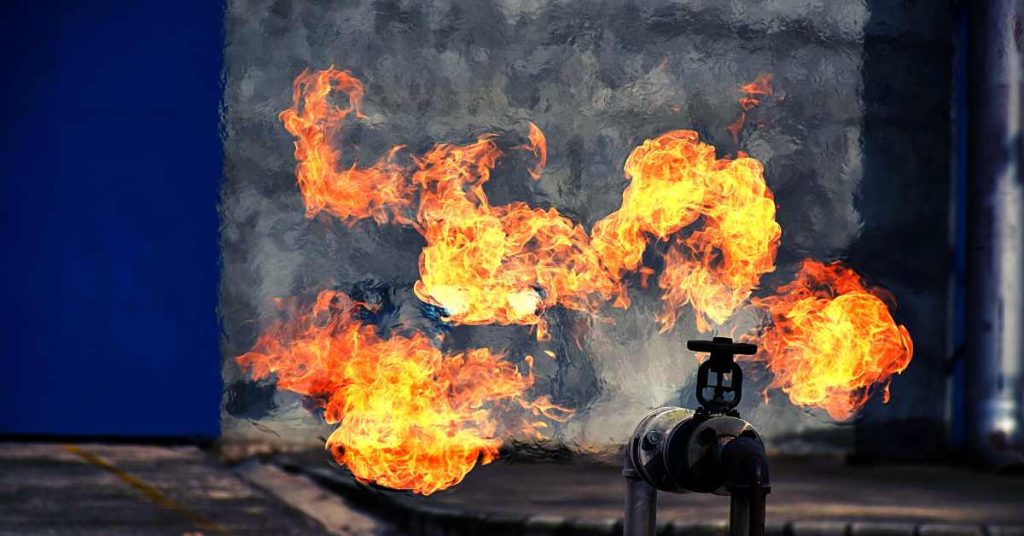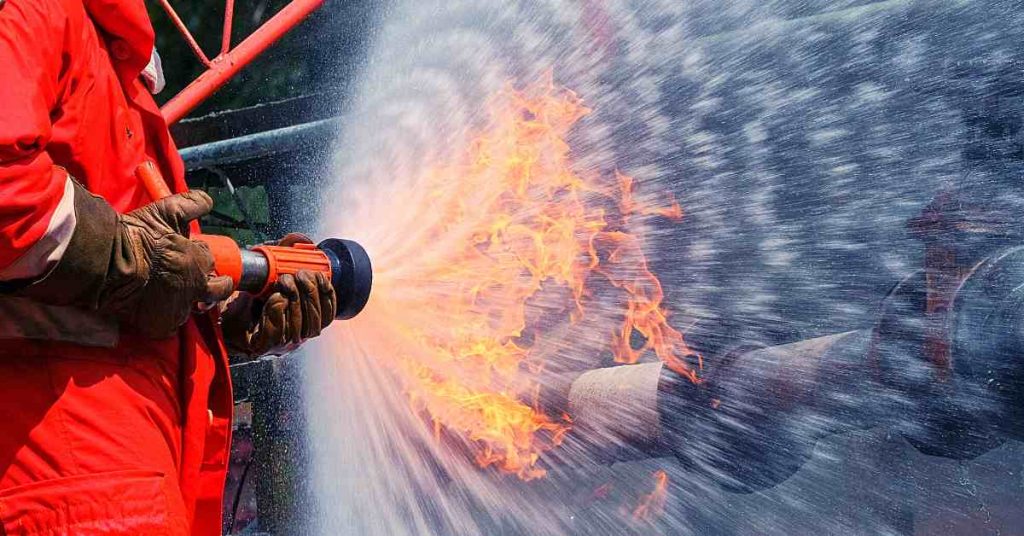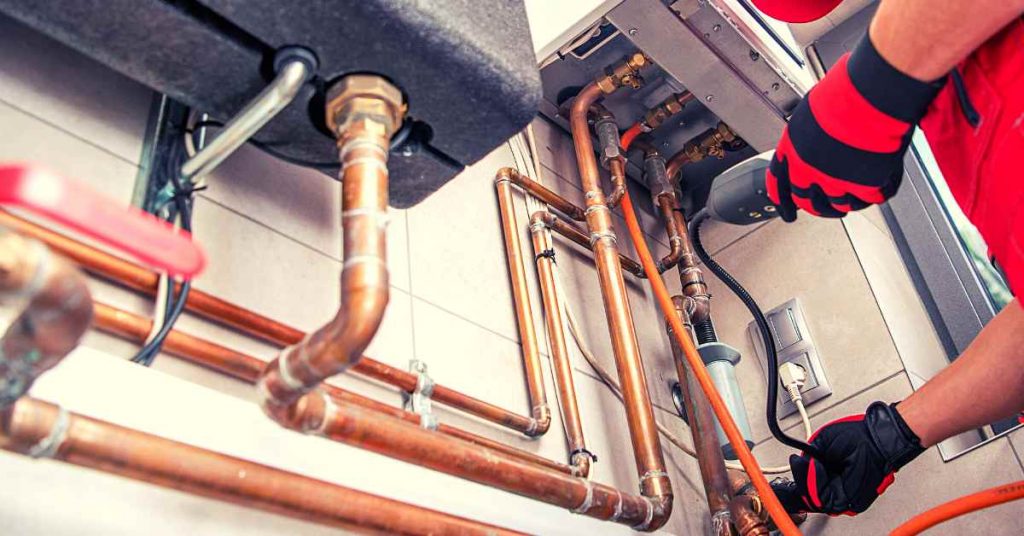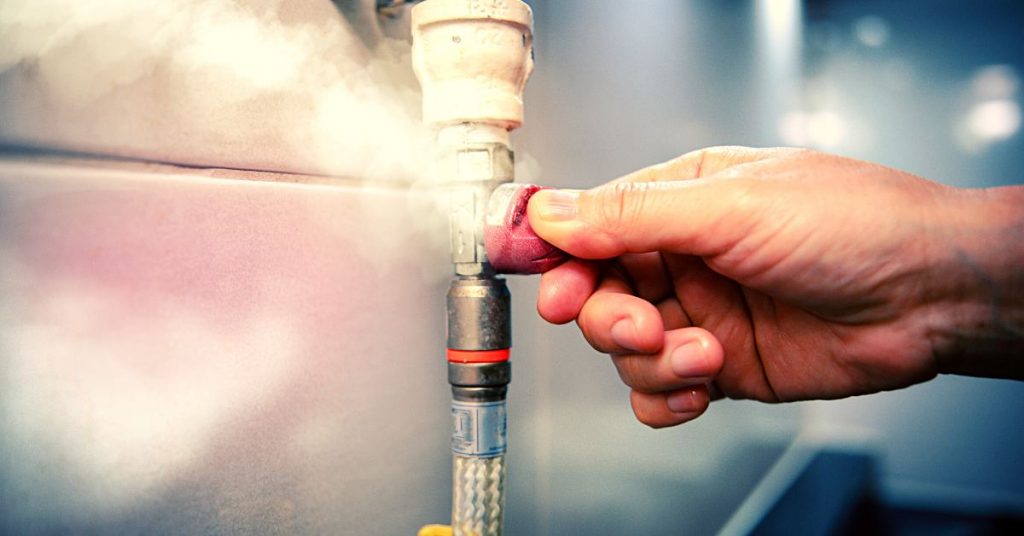How To Fix A Gas Leak: Signs, Symptoms, & Fix

How To Fix A Gas Leak in Easy Ways?
If you live in a home with gas lines, it’s essential to know how to fix a gas leak. Gas leaks can cause severe health and safety hazards and be challenging to detect. This article will discuss the different types of gas leaks and how to fix them.

- What Is A Gas Leak?
- Identify The Type Of Gas Leak
- Evacuate If Necessary
- Signs Of A Gas Leak
- How to Stop a Gas Leak?
- What To Do If You Smell Gas?
- Shut Off The Main Source Of Gas
- Repair the Leak
- Ventilate The Area
- How To Fix A Gas Leak?
- What to Do if You Can't Stop the Leak?
- What to Do if There's an Explosion?
- How to Clean Up After a Gas Leak?
- Tips For Preventing Gas Leaks
- Final Words
What Is A Gas Leak?
A gas leak is when gas escapes from a confined area, such as an appliance, pipe, or tank.
The gas can be poisonous if it enters the air and can cause significant damage if it leaks into a building.
There are several ways to detect and fix a gas leak.
If you think you may have a gas leak, call your local emergency services immediately.
Identify The Type Of Gas Leak
There are three types of gas leaks:
- Natural gas,
- Propane, and
- Butane.
To identify the type of gas leak,
- First assess the scene.
- If it’s outdoors, look for natural gas release points such as cracks in the pavement or large puddles on the ground.
- Indoors, look for propane and butane release points such as appliances that have been turned off or leaking pipes near walls or under furniture.
- Call a professional if you can’t determine the type of gas leak.
Evacuate If Necessary
If you smell gas, evacuate immediately. A gas leak can be hazardous. If you cannot evacuate safely, try to seal the leak with a bucket or container. If the gas is coming from an appliance, turn it off and call a professional.

Signs Of A Gas Leak
If you smell gas, there is a high probability of a gas leak. If you detect any of the following signs of a gas leak, please act quickly to prevent an explosion or fire:
The following are some of the most common signs of a gas leak:
- A gas smell in the air.
- Slight odor of gas in the air.
- Strange noises are coming from the area where the gas is leaking.
- Fumes or sparks come from the area where the gas is leaking.
If you notice any of these signs, do not attempt to fix the leak yourself. Contact a professional immediately.
How to Stop a Gas Leak?
Gas leaks are the number one cause of home fires. Here is how to stop a gas leak:
If you smell gas, DO NOT light a match or use any other flame to see if there is a leak. If you light a match, use it to look for the location of the gas leak. Once you have located the leak, turn off the main gas valve at the meter and call your gas company.
There are a few ways to stop a gas leak if you notice one:
- Use a plunger to suction the gas out of the pipe.
- Use a vacuum cleaner to remove the gas.
- Call a professional.
- Cover the hole with a bucket or piece of cloth.
What To Do If You Smell Gas?
If you smell gas, you can do a few things to try and fix the leak. The most common way to detect a gas leak is by smell. If you notice a strange odor coming from your home or office, there is a good chance that there is a gas leak present. Here are some tips on how to fix a gas leak:
- Try to identify the source of the gas smell. Is it coming from your stove, fireplace, or another appliance? Once you know where the gas smell is coming from, you can start troubleshooting the source of the leak.
- Check for any apparent signs of a gas leak. Are there flames or sparks coming from an open flame? Are there any weird odors in the air? If so, there may be a severe gas leak, and you should call emergency services as soon as possible.
- Shut off the primary power source to your home or office. This could be turning off all of the fuses in your home or office, turning off your breaker box, or shutting down your computer. Turn off all of the natural gas lines in your home before doing this so that you don't accidentally cause a house fire.

Shut Off The Main Source Of Gas
If the leak is small, you can try to use a plunger to try to suck the gas out. You'll need to call a professional if the leak is more extensive.
If the leak is minor and doesn't pose a danger, you can try to fix it yourself using these tips:
- Shut off the primary gas source using the valve near the stove or in the wall.
- Turn off all nearby lights and appliances and wait five minutes for any residual gas to escape before turning them back on.
- Open windows and doors as much as possible to allow airflow into and out of the home.
- Put a towel over your nose and mouth and stand three feet from the leak.
- Pour a gallon of water into a bucket or container.
- Turn on the gas valve slowly with the plunger held tightly against the nozzle until there's no more hissing noise.
- Release the plunger slowly, then turn off the valve.
- Wet down the area where the pipe meets the ground with water from the bucket or container. Be sure to do this near both ends of where the line enters.
Repair the Leak
If you smell gas, there is a good chance that it is leaking. Here are a few steps to take if you notice a gas leak:
- Turn off the main gas supply to the home. This can be done by turning the knob on the front of the stove or turning off the breaker in your home’s electrical panel.
- If you have an alarm system, disarm it. Gas leaks can set off alarms.
- Shut off any outside vents that could let gas escape (this includes your home’s air conditioning and heating vents).
- Check for open windows or doorways that may allow gas escape.
- Use a vacuum cleaner with a high-powered hose to suck up any gas that has leaked out of the home. Be careful not to let the suction damage surfaces or appliances around the leak!
- Contact a professional to fix the leak if necessary.
Ventilate The Area
If you've detected a gas leak, the first and most important thing you need to do is evacuate the area.
Then, if the leak is small, try to stop it using a bucket, rug, or your hand. If the leak is more significant, use a plunger or a vacuum cleaner to suction onto the pipe and pull.
How To Fix A Gas Leak?
If you notice a gas leak in your home, you should first turn off the main gas valve. Do not try to fix the leak yourself.
- If the leak is small, you can try to plug it with a cloth or piece of paper.
- Or if the leak is more significant, call a professional.
- If the gas is turning on and off by itself, there may be a problem with your gas line.
- Check if something is wrapped around the pipe where it enters your home. If so, remove the obstruction and call a professional.
- If the leak comes from a pipe that runs under your house, you may have to call a professional to dig up the floor and fix the leak.
If you smell gas, there is a good chance that a gas leak is present.
Here are some tips on how to fix a gas leak:
- If you can access the leak, turn off the main valve that supplies the gas to the area. This will stop the gas flow and allow you to assess the situation.
- If you cannot access the leak, call a professional to help you shut down the valve and fix the problem.
- If the leak is small and can be fixed on your own, use a bucket to catch any gas that escapes and use a plunger or vacuum cleaner to suck up any liquid leaking from the pipe. Do not attempt to fix minor leaks on your own if they are near electrical wires or hot surfaces.
What to Do if You Can't Stop the Leak?
Gas leaks can be dangerous and expensive to fix. If you can't stop the leak, follow these steps:
- Look for any open windows or doors that may be allowing gas into the room. Close them if you find them.
- Turn off the main switch to the gas line in the room. You may need to do this from a distance because turning off the central controller may cause a spark that could ignite the gas.
- If you can't turn off the main switch, use a garden hose to shut off the gas line at the meter. Use caution because water can also create a spark and ignite the gas.
- Call a professional to help you stop the leak.
What to Do if There's an Explosion?
If you're in the area of a gas leak, don't try to walk to the leak. Instead, follow these steps:
- Assess the scene. If it's safe to do so, try to determine if there is any structural damage. If so, evacuate the building.
- Shut off the gas and electricity to the area around the gas leak.
- Use a hose to remove any flames or sparks caused by the leak.
- Protect yourself from possible harm. Wear protective gear, including a face shield and rubber gloves if needed.
- Call for help. Dial 911 if necessary and let them know about the gas leak and your location.
How to Clean Up After a Gas Leak?
If you experience a gas leak, the first thing you need to do is evacuate the area. Shut off the gas and call a professional.
Once the site is evacuated, shut off the main valve to the house and call a professional to come and fix the leak. Here are some tips on how to clean up after a gas leak:
- Clear any combustible items away from the area where the gas leaked.
- Shut off all appliances and turn off all lights in the area.
- If you smell gas, don't touch anything! Get out of the area immediately!
- Use a vacuum cleaner with a hose attachment to suck up any leaking gas or oil. Be careful not to inhale fumes from the vacuum cleaner!
- Pour a pot of hot water over the area where gas or oil has spilled, and let it sit for about five minutes. This will start melting any plastic or rubber that has been spilled, making it easier to clean up.
- Wipe down walls, floors, furniture, and other surfaces with a sponge or cloth soaked in detergent and water. Be sure to get into cracks and crevices.
Tips For Preventing Gas Leaks
If you are like most homeowners, your first impulse upon noticing a gas leak is to call the gas company. However, if the leak is small and you can identify and fix the source of the problem yourself, doing so may be the best course of action.
Here are four tips for preventing gas leaks:
- Check all your appliances to see if they are leaking. If you have a gas stove, look for a spark from the pilot light. Check for leaks around the burners and oven door if you have a range. If you have a dishwasher, check for leaks around the drain hose.
- Check your chimney for signs of leakage. A buildup of soot or leaves on the top of your chimney may indicate a leak elsewhere in your home.
- Check your foundation for cracks or holes that could allow gas to escape. Signs of a foundation issue include shifting or sagging floors, rusted rebar, or damage to the soil beneath your home.
- Inspect all pipes and tubes entering and leaving your home. Check for cracks, kinks, or other damage that could allow gas to escape undetected.
Final Words
Have you been dealing with a gas leak? If so, you know that dealing with the gas can be dangerous and frustrating. In this article, we will teach you how to fix a gas leak in as little time as possible. By following these simple steps, you should be able to get your home back to normal quickly and without injury. So hurry and read through the tips below.

Recommendation